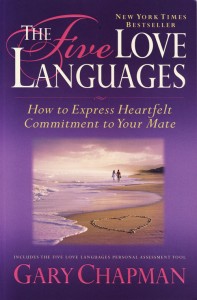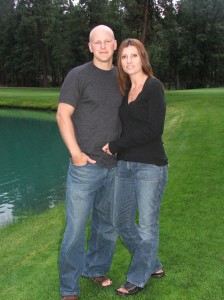Love Languages
Have you ever heard of someone say,
“that’s my love language.” Or, “that must be their love language.”
…and have NO CLUE as to what they were talking about?
Well, let me fill you in…
“What if you could say or do just the right thing
guaranteed to make that special someone feel loved?
The secret is learning the right love language!”
 This book was written by Gary Chapman, a marriage counselor, in 1992.
This book was written by Gary Chapman, a marriage counselor, in 1992.
Here’s a little background from “5 Love Languages dot com,”
“With more than 30 years of experience as a marriage counselor,
Dr. Gary Chapman has heard it all.
He has helped couples at every stage of marriage
and at pivotal points in their relationships—
from those just discovering the joys and trial of marriage
to those who are ready to call it quits.
After many years of counseling, Dr. Chapman noticed a pattern:
everyone he had ever counseled had a “love language,”
a primary way of expressing and interpreting love.
He also discovered that, for whatever reason,
people are usually drawn to those who speak
a different love language than their own.“
“”The 5 Love Languages® has helped countless couples identify
practical and powerful ways to express love,
simply by using the appropriate love language.
Many husbands and wives who had spent years struggling
through marriages they thought were loveless
discovered one or both spouses
had long been showing love through
messages that weren’t getting through.
By recognizing their different love languages,
they witnessed the rebirth of the love
they thought had been gone for good.”” (ps…remember I’m huge prego,
(ps…remember I’m huge prego,
so I totally don’t look like this right now…I just love the pic)
My husband and I have been taking this amazing
relationship class (that I super duper love and never want to miss,)
once a week and part of our study has been this great book.
I read it the week it was given to me and have referred back
to it so many times.
The truth is, it’s not just about how we can build our relationship
as a couple, but it’s also about how we can build
ALL OF OUR RELATIONSHIPS.
This can be with our children, our parents, our siblings, our friends,
and the list goes on and on!
I LOVE IT!!!!
(yep, I just screamed those words)
Because, once I started to understand the languages and how
other people work, then I knew exactly how to show my love for others.
I found this brief book overview on the 5 love languages
so you can get a quick idea on how it works…
“5 Love Languages Book Review.”
It goes through all five;
Quality Time
Words of Affirmation
Receiving Gifts
Acts of Service
& Physical Touch.
Check it out, because it really does explain things quickly.
But…THE POINT to this post is to let you know
how I’ve been using it in other ways.
And that, is primarily with my kiddos.
I found this on “Positive Parenting.com“
“The other day as I was driving some gizzillionth place, I had the privilege to listen to Gary Chapman speaking on his book Love Languages for Kids. He said the coolest thing – “you can tell your child’s love language by his most frequents requests.” Really?!
If he asks, “Can I help you mom?” his love language is service.
If he asks, “Did I do a good job mom?” his love language is words of affirmation.
If he asks, “Do you like the picture I colored for you mom?” his love language is gifts.
If he asks, “Can I snuggle with you mom?” his love language is touch.
If he asks, “Can I go with you mom?” his love language is time.
Easy, speasy!”
I also found this great book review from Janet Boyer on “Amazon.com” on Chapman’s book,
“The 5 Love Languages of Children.”
Chapman, with co-writer Ross Campbell, M.D., have written The Five Love Languages Of Children, which applies the love language theory to children. How can you tell your child’s main love language? Chapman offers these suggestions:
1. Observe how your child expresses love to you.
Chapman and Campbell: Watch your child; he may well be speaking his own language. This is particularly true of a young child, who is very likely to express love to you in the language he desires most to receive.
I’ve seen this with my own 4 1/2 year old. Noah will come up to me or my husband, and try to engage us in a wrestling match. Or he’ll pat our arms, give us a hug, etc. He has shown us that his main love language is that of Physical Touch!
2. Observe how your child expresses love to others.
If you notice your child making crafts for relatives, or wanting to take presents to classmates or teacher, this may indicate that her primary love language is Gifts.
3. Listen to what your child requests most often.
If your child often asks you questions like “How do I look, Mommy?”, “What do you think of my drawing?”, or “Did you think I did well at practice today?”, this pattern may indicate that his love language is Words of Affirmation.
4. Notice what your child most frequently complains about.
Frequent complaints such as “You never have time for me”, “Why don’t you play games with me?”, or “We never do things together” would be indicative of the need for Quality Time.
5. Give your child a choice between two options.
Chapman and Campbell suggests to lead your child to make choices between two love language. For example, a Dad might say to his son, “I have some free time Saturday. Would you like me to fix your bike, or would you rather go to the park together and shoot some hoops?”. The choice is between Acts of Service and Quality Time. A mother may say, “I have some time tonight. Would you like to go shopping, and I’ll help you pick out a new outfit, or would you rather stay home and we’ll do a puzzle together?” You’ve given her the choice between Gifts and Quality Time.
Chapman and Campbell explain: As you give options for several weeks, keep a record of your child’s choices. If most of them tend to cluster around one of the five love languages, you have likely discovered which one makes your child feel most loved. At times, your child will not want either option, and will suggest something else. You should keep a record of those requests also, since they may give you clues.
Of course, the choices you offer your child will depend on age and interest.
I highly recommend this book for understanding your child’s own unique love languages, and how you can better fill his or her “love tank!”
